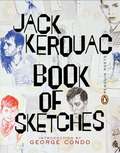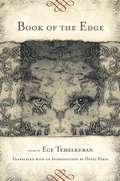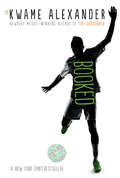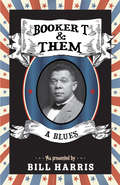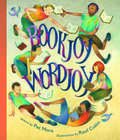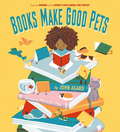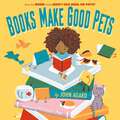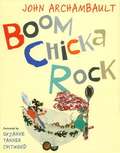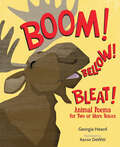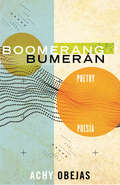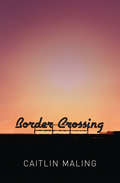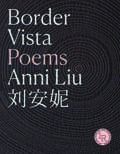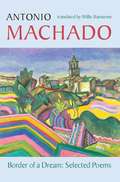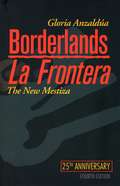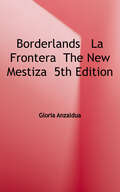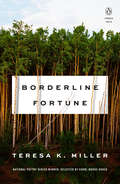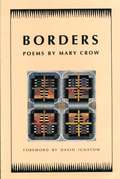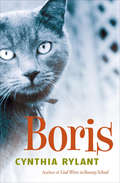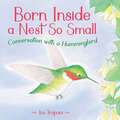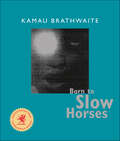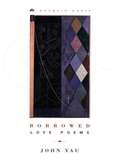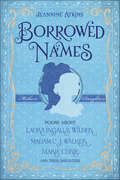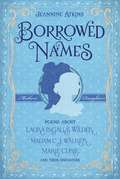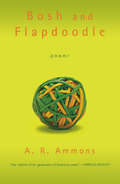- Table View
- List View
Book of Sketches
by Jack Kerouac George CondoIn 1952 and 1953 as he wandered around America, Jack Kerouac jotted down spontaneous prose poems, or "sketches" as he called them, on small notebooks that he kept in his shirt pockets. The poems recount his travels--New York, North Carolina, Lowell (Massachusetts, Kerouac's birthplace), San Francisco, Denver, Kansas, Mexico--observations, and meditations on art and life. The poems are often strung together so that over the course of several of them, a little story--or travelogue--appears, complete in itself. Published for the first time, Book of Sketches offers a luminous, intimate, and transcendental glimpse of one of the most original voices of the twentieth century at a key time in his literary and spiritual development.
Book of the Edge
by Ece Temelkuran Deniz PerinEce Temelkuran is arguably Turkey's most accomplished young writer. In Book of the Edge, she describes an allegorical journey wherein the speaker, or explorer, encounters strange creatures, including a butterfly, bull, swordfish, sow bug, and cruel city dwellers. These poems point to the undeniable connection between all living beings.Born 1973 in Turkey, Ece Temelkuran (www.ecetemelkuran.com) has published eight books of poetry, prose, and nonfiction. An award-winning daily columnist for Milliyet, she was a 2008 visiting fellow at the University of Oxford's Reuters Institute for the Study of Journalism.Translator Deniz Perin received the 2007 Anna Akhmatova Fellowship for Younger Translators.
Book of the Edge (Lannan Translations Selection Series)
by Ece TemelkuranEce Temelkuran is arguably Turkey&’s most accomplished young writer. In Book of the Edge, she describes an allegorical journey wherein the speaker, or explorer, encounters strange creatures, including a butterfly, bull, swordfish, sow bug, and cruel city dwellers. These poems point to the undeniable connection between all living beings.Born 1973 in Turkey, Ece Temelkuran (www.ecetemelkuran.com) has published eight books of poetry, prose, and nonfiction. An award-winning daily columnist for Milliyet, she was a 2008 visiting fellow at the University of Oxford&’s Reuters Institute for the Study of Journalism.Translator Deniz Perin received the 2007 Anna Akhmatova Fellowship for Younger Translators.
Booked: Mystery Books For Kids (The Crossover Series #2)
by Kwame Alexander<P>Like lightning <br>you strike <br>fast and free <br>legs zoom <br>down field <br>eyes fixed <br>on the checkered ball <br>on the goal <br>ten yards to go <br>can't nobody stop you <br>can't nobody cop you... <P>In this follow-up to the Newbery-winning novel THE CROSSOVER, soccer, family, love, and friendship, take center stage as twelve-year-old Nick learns the power of words as he wrestles with problems at home, stands up to a bully, and tries to impress the girl of his dreams. Helping him along are his best friend and sometimes teammate Coby, and The Mac, a rapping librarian who gives Nick inspiring books to read. <P>This electric and heartfelt novel-in-verse by poet Kwame Alexander bends and breaks as it captures all the thrills and setbacks, action and emotion of a World Cup match!
Booker T & Them: A Blues
by Bill HarrisA poetic reimagining of the life of Booker T. Washington that explores issues of being an African American male of note at the beginning of the twentieth century.
Bookjoy, Wordjoy
by Pat MoraAn inspiring collection of Pat Mora's own glorious poems celebrating a love of words and all the ways we use and interact with them: reading, speaking, writing, and singing.Whether we are collecting words, reading favorite books in the library, celebrating holidays, writing poems, sharing secrets, or singing a jazzy duet, words and books can take us on wonderful adventures and bring us joy. Poet Pat Mora has brought together a collection of her poems that celebrates engaging with words and books in all these ways and more. Vivid illustrations by Raúl Colón bring the poems to life and interpret the magic of the language with captivating images in a style influenced by Mexican muralists. Together the poems and illustrations are sure to inspire creative wordplay in readers of all ages. We can read, you and I,see letters become words,and words become books ...You and I read, round and round,bookjoy around the world.
Books Make Good Pets
by John AgardBooks make good pets and don't need going to the vet.You don't have to keep them on a lead or throw them a stick.They'll wag their words whenever you flick their dog-eared pages.Even howl an ancient tale for the inward-listening ear.Did you know that a book can take you anywhere? You only need to turn the pages of a story, and in a moment, you and your book could be crossing the waves in a pirate ship... or diving with mermaids... or even snoozing with a dragon.Books really DO make good pets! Why don't you peep inside this one, and take your mind on an adventure?This delightful original picture book poem is the perfect gift for anyone who delights in the magic of a good book. Agard's evocative, lyrical style is perfectly complemented with illustrations by Momoko Abe, whose colourful visuals add character, transporting the reader into an enchanting world of imagination.
Books Make Good Pets
by John AgardBooks make good pets and don't need going to the vet.You don't have to keep them on a lead or throw them a stick.They'll wag their words whenever you flick their dog-eared pages.Even howl an ancient tale for the inward-listening ear.Did you know that a book can take you anywhere? You only need to turn the pages of a story, and in a moment, you and your book could be crossing the waves in a pirate ship... or diving with mermaids... or even snoozing with a dragon.Books really DO make good pets! Why don't you peep inside this one, and take your mind on an adventure?This delightful original poem is the perfect listen for anyone who delights in the magic of a good book. Agard's evocative, lyrical style is perfectly performed by him in this audiobook, transporting the listener into an enchanting world of imagination.(P) 2022 The Watts Publishing Group Limited
Boom Chicka Rock
by John Archambault12 mice who live in a cuckoo clock wander out to find birthday cake and have a party while Max the cat sleeps.
Boom! Bellow! Bleat!: Animal Poems for Two or More Voices
by Georgia HeardA NCTE Notable Poetry BookThis playful collection of poems--peppered with an astounding variety of animal sounds--is meant to be read aloud together.These poems for two or more voices explore the myriad sounds animals make--from a frog's jug-o-rum to a fish's boom! to an elephant's bark. Laced with humor, the poems are a delight to read aloud and cover all major classes of animals: mammals, birds, fish, reptiles, amphibians, insects, even a crustacean! Readers will learn how to estimate the temperature by counting a cricket's chirps and see how creatures make sounds at specific pitches and frequencies, so that they can be heard despite other noise around them. Extensive end notes provide more information on the animals and how and why they make the sounds they do. Written by noted children's poet Georgia Heard, this is an ideal collection for parents and children to share, or for a fun, interactive classroom read-aloud.
Boomerang / Bumerán: Poetry / Poesía (Raised Voices)
by Achy ObejasA bilingual poetry collection from a Cuban-American writer-activist that explores themes of identity, sexuality, and belongingA unique and inspiriting bilingual collection of lyrical poetry written in a bold, mostly gender-free English and Spanish that address immigration, displacement, love and activism.The book is divided into 3 sections: First, poems addressing immigration and displacement; secondly, those addressing love, lost and found, and finally, verses focusing on action, on ways of addressing injustice and repairing the world. The volume will be both inspiration and support for readers living with marginalized identities and those who love and stand with them.
Border Crossing
by Caitlin MalingCaitlin Maling's second volume, Border Crossing, continues to showcase the development of an exciting new voice in Australian poetry. Now Maling's poems shift from the first volume's gritty treatment of childhood and adolescence growing up in WA, to a consideration of what it is to be an Australian in America, where the conflicting voices and identities of home and abroad jostle against and seek their definitions from each other. In this volume, as in the first, her emphasis on place – geography and environment – is as strong as ever.
Border Vista: Poems
by Anni LiuWinner of the 2020 Lexi Rudnitsky First Book Prize in Poetry, a striking exploration of being undocumented in America Border Vista intimately narrates the experience of being undocumented, or precariously documented, in America. In poems that consider migration as an ongoing process rather than a finite event, Anni Liu writes exquisitely and on fear (useful and paranoid) and agency, loneliness, and the way the violence of the carceral state shapes our most intimate relationships to each other and to the land. As she does, she revisits moments of unexpected poignancy: searching for turtles in a drainage ditch, picking crabapples along a rural highway, smelling the namesake flower of her mother, who is half a world away.
Border of a Dream
by Willis Barnstone Antonio MachadoAntonio Machado (1875-1939) is Spain's master poet, the explorer of dream and landscape, and of consciousness below language. Widely regarded as the greatest twentieth century poet who wrote in Spanish, Machado--like his contemporary Rilke--is intensely introspective and meditative. In this collection, the unparalleled translator Willis Barnstone, returns to the poet with whom he first started his distinguished career, offering a new bilingual edition which provides a sweeping assessment of Machado's work. In addition, Border of a Dream includes a reminiscence by Nobel Laureate Juan Ramón Jiménez and a foreword by John Dos Passos.from "Proverbs and Songs"Absolute faith. We neither are nor will be.Our whole life is borrowedWe brought nothing. With nothing we leave.*You say nothing is created?Don't worry. With clayof the earth make a cupso your brother can drink.Born near Seville, Spain, Antonio Machado turned to a career in writing and translating in order to help support his family after the death of his father in 1893. His growing reputation as a poet led to teaching posts in various cities in Spain and, eventually, he returned to finish his degree from the University of Madrid in 1918. He remained in Madrid after the outbreak of civil war, committed to the Republican cause, but the violence finally forced him to flee. He died an exile in France.Willis Barnstone is one of America's foremost translator-poets, bringing into English an extraordinary range of work, from Mao Tse-tung to the New Testament.
Borderlands / La Frontera: The New Mestiza
by Gloria Anzaldúa Aída Hurtado Norma Cantu<P>Rooted in Gloria Anzaldúa's experience as a Chicana, a lesbian, an activist, and a writer, the essays and poems in this volume profoundly challenged, and continue to challenge, how we think about identity. <P>Borderlands / La Frontera remaps our understanding of what a "border" is, presenting it not as a simple divide between here and there, us and them, but as a psychic, social, and cultural terrain that we inhabit, and that inhabits all of us. <P>This twenty-fifth anniversary edition features a new introduction by scholars Norma Cantú (University of Texas at San Antonio) and Aída Hurtado (University of California at Santa Cruz) as well as a revised critical bibliography. <P>Gloria Anzaldúa was a Chicana-tejana-lesbian-feminist poet, theorist, and fiction writer from south Texas. She was the editor of the critical anthology Making Face/Making Soul: Haciendo Caras (Aunt Lute Books, 1990), co-editor of This Bridge Called My Back: Writings by Radical Women of Color, and winner of the Before Columbus Foundation American Book Award. She taught creative writing, Chicano studies, and feminist studies at University of Texas, San Francisco State University, Vermont College of Norwich University, and University of California Santa Cruz. <P>Anzaldúa passed away in 2004 and was honored around the world for shedding visionary light on the Chicana experience by receiving the National Association for Chicano Studies Scholar Award in 2005. Gloria was also posthumously awarded her doctoral degree in literature from the University of California, Santa Cruz. A number of scholarships and book awards, including the Anzaldúa Scholar Activist Award and the Gloria E. Anzaldúa Award for Independent Scholars, are awarded in her name every year.
Borderlands / La Frontera: The New Mestiza
by Gloria AnzaldúaA new edition of Anzaldúa's classic text. "The U.S-Mexican border es una herida abierta where the Third World grates against the first and bleeds. And before a scab forms it hemorrhages again, the lifeblood of two worlds merging to form a third country—a border culture." <p>Gloria Anzaldúa <p><p>Rooted in Gloria Anzaldúa's experience as a Chicana, a lesbian, an activist, and a writer, the essays and poems in BORDERLANDS/LA FRONTERA: THE NEW MESTIZA profoundly challenged, and continue to challenge, how we think about identity. BORDERLANDS/LA FRONTERA remaps our understanding of what a "border' is, presenting it not as a simple divide between here and there, us and them, but as a psychic, social, and cultural terrain that we inhabit, and that inhabits all of us.
Borderline Fortune (Penguin Poets)
by Teresa K. MillerA collection that explores inherited trauma on an individual and communal level, from a National Poetry Series–winning poet who &“refus[es] the mind&’s limits&” (Carol Muske-Dukes)Borderline Fortune is a meditation on intangible family inheritance—of unresolved intergenerational conflicts and traumas in particular—set against the backdrop of our planetary inheritance as humans. As species go extinct and glaciers melt, Teresa K. Miller asks what we owe one another and what it means to echo one&’s ancestors&’ grief and fear. Drawing on her family history, from her great-grandfather&’s experience as a schoolteacher on an island in the Bering Strait to her father&’s untimely death, as well as her pursuit of regenerative horticulture, Miller seeks through these beautifully crafted poems to awaken from the intergenerational trance and bear witness to our current moment with clarity and attention.
Boris
by Cynthia RylantBoris is a big gray cat who loves sleeping and playing and exploring and hunting. And his owner loves him for all of his simple cat ways.But Boris, typical as he may be, is part of a much larger story in this moving exploration of love, longing, compassion, and most of all, the continuous give-and-take of companionship.Newbery medalist Cynthia Rylant's powerful collection of poems is sure to find its place in the hearts of readers of all ages, especially those who have been lucky enough to experience the many joys and hardships that come with true friendship.
Born Inside a Nest So Small
by Iza TrapaniA young child observes and admires a friendly ruby-throated hummingbird in this poetic love letter to the smallest birds in the world.A perfect rhyming and informative picture book about hummingbirds for curious 4-7-year-old backyard birders.Hummingbird, you nectar lover,how you dash and dart and hover—forward, backward, upside down.I love to watch you zip around.Admire a playful ruby-throated hummingbird alongside a young child, and learn about these birds&’ lives from teeniest tiniest egg to migrating south as the seasons change. With Iza Trapani&’s pleasing rhymes and gentle introduction to these little hummers, young readers will delight in repeat read alouds!Back matter includes further reading on hummingbirds for the most insatiable kids.
Born to Slow Horses (Wesleyan Poetry Series)
by Kamau BrathwaiteWinner of the Griffin International Poetry Prize (2006)Kamau Brathwaite's Born to Slow Horses is a series of poetic meditations on islands and exile, language and ritual, and the force of personal and historical passions and griefs. These poems are haunted, figuratively and literally, by spirits of the African diaspora and drenched in the colors, sounds, and rhythms of the islands. But they also encompass the world of the exile and return, and the events of 9/11 in New York City. Brathwaite is one of the foremost voices in postcolonial inquiry and expression, and his poetry is densely rooted and expansive.Using his unusual "sycorax" signature typography and spelling, Brathwaite brings a cultural specificity, with distinct accents, sonic gestures, and pronunciations, into his pages—making them new, exciting, and rich in nuances.
Borrowed Love Poems
by John YauIf the "I" cannot be representative, what or who can it represent? In John Yau's new collection, Borrowed Love Poems, the reader encounters artists (Hiroshige and Eva Hesse), poets (Marina Tsvetayeva and Georg Trakl), actors (Boris Karloff and Peter Lorre), and memorable figures (a retired wrestler and a private eye named Genghis Chan). Each becomes a spectral, sonorous presence inhabiting the polymorphic body of the page, a shadow of a shadow lit from within. Yau's poems are dazzling explorations of the multiple, shifting sands of identity, of the fictional, fake, factual, and autobiographical selves that pass like ghosts through the empty space known as "I. " Able to seamlessly merge a strict yet eccentric methodology with wild flights of the imagination, Yau moves into a rich, complex realm, where the flickering edges of consciousness-the dream state-become poetry.
Borrowed Names: Poems About Laura Ingalls Wilder, Madam C.J. Walker, Marie Curie, and Their Daughters
by Jeannine AtkinsAs a child, Laura Ingalls Wilder traveled across the prairie in a covered wagon. Her daughter, Rose, thought those stories might make a good book, and the two created the beloved Little House series. Sara Breedlove, the daughter of former slaves, wanted everything to be different for her own daughter, A'Lelia. Together they built a million-dollar beauty empire for women of color. Marie Curie became the first person in history to win two Nobel prizes in science. Inspired by her mother, Irène too became a scientist and Nobel prize winner. Borrowed Names is the story of these extraordinary mothers and daughters. Borrowed Names is a 2011 Bank Street - Best Children's Book of the Year.
Borrowed Names: Poems about Laura Ingalls Wilder, Madam C. J. Walker, Marie Curie, and Their Daughters
by Jeannine AtkinsAs a child, Laura Ingalls Wilder traveled across the prairie in a covered wagon. Her daughter, Rose, thought those stories might make a good book, and the two created the beloved Little House series. Sara Breedlove, the daughter of former slaves, wanted everything to be different for her own daughter, A'Lelia. Together they built a million-dollar beauty empire for women of color. Marie Curie became the first person in history to win two Nobel prizes in science. Inspired by her mother, Irene too became a scientist and Nobel prize winner. Borrowed Names is the story of these extraordinary mothers and daughters.
Bosh and Flapdoodle: Poems
by A. R. Ammons"No other contemporary poet, in America, is likelier to become a classic than A. R. Ammons."—Harold Bloom Bosh and Flapdoodle is A. R. Ammons's last completed collection of poetry. Written over a six-week period, the book offers a series of candid, alternately hilarious and heartbreaking ruminations on age, illness, and death, while still finding room for the poet's always penetrating observations of daily life and natural events.
